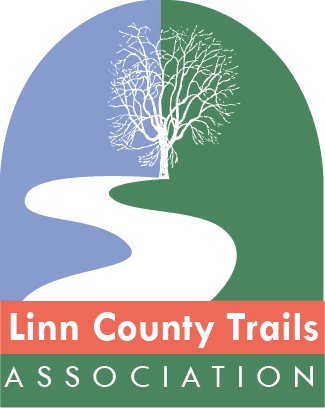February 11, 2011
Dear Friends of the Linn County Trails Association,
As an organization that advocates for trail usage and development in Linn County, we want to share this important piece of proposed legislation with you.
The Complete Streets Bill, HF 59, has been introduced in the Iowa House and calls for the adoption and implementation of complete streets principles applicable to certain highway projects. The bill establishes design guidelines to accommodate all users including bicycles and pedestrians.
Complete Streets is a concept promoted by the National Complete Streets Coalition (www.completestreets.org). This organization “seeks to fundamentally transform the look, feel, and function of the roads and streets in our community, by changing the way most roads are planned, designed, and constructed (www.completestreets.org/who-we-are).
In October of 2008, the City of Cedar Rapids created the Bicycle Advisory Committee which is responsible for moving Cedar Rapids towards Bicycle Friendly Community status designation from the League of American Bicyclists. Not only does the Complete Streets principle support the application of the Bicycle Friendly Community status, but also the mission of the Linn County Trails Association. Complete Streets principles promote safety, health, economic development, and improved livability. Walking, running, bicycling are important activities for a healthful community. Accommodating all users on street right-of-way is an economical way to provide connectivity so a user can go from “anywhere” to “anywhere”. While LCTA supports separated trails, they are not always possible or economical for complete connectivity, hence we need complete streets.
There is much work to be done in the Cedar Rapids metropolitan area to be designated as a Bicycle Friendly Community. The local communities cannot do it alone, but HF 59 can help. According to National Complete Streets Coalition, two Iowa communities have a resolution or a policy already in place supporting Complete Streets (Des Moines and Johnson County, respectively). The Corridor Metropolitan Planning Organization (CMPO) has also adopted a Long Range Transportation Plan Document that includes complete streets design principles (www.connections2040.com). Chapter 7 addresses complete streets.
As a supporter of LCTA, please contact your government representatives to encourage them to adopt these principles. The State of Iowa should adopt Bill HF 59 to support the efforts of our local communities.
Below is more information on the Complete Streets Bill, HF 59, and email addresses of key state representatives. Please consider notifying your representatives of you interest and concern on this matter. Bill HF 59 (only 4 pages long) can be found on the LCTA website: www.linncountytrails.org. If you have any questions, please feel free to contact LCTA President, John Wauer at president@linncountytrails.com.
Thank you,
LCTA Board
To read the full bill, click here.
The following is a direct copy of Bill HF 59 summary:
This bill provides a mechanism for the implementation of “complete streets” principles in highway projects undertaken on Iowa roads. The bill defines “complete street” as a roadway that accommodates all users of the road including motorists, public transit users, bicyclists, and pedestrians of all ages and abilities. The bill expresses the general assembly’s intent that every agency having jurisdiction over roads or involved in planning for roads shall develop and adopt a complete streets policy on or before October 1, 2013. Affected agencies include the department of transportation, regional and metropolitan planning commissions, counties, and cities. The complete streets policy for the state shall apply to all highway projects on primary roads, and the policies of other agencies shall focus on roads in urban areas or within one mile of the corporate limits of a city. All complete streets policies shall contain a procedure by which an agency may exempt a highway project from the agency’s complete streets policy for specific reasons stated in the bill. The department of transportation is directed to provide guidance to local agencies and conduct ongoing research regarding complete streets to assist agencies formulating complete streets policies. The director of transportation is required to issue by October 1, 2012, and periodically update, a report describing best practices of transportation agencies in other states that have implemented complete streets principles. The bill creates a complete streets fund for deposit of any federal, state, or private moneys available for purposes of complete streets. Moneys deposited in the fund are appropriated to the department of transportation to be used to facilitate complete streets projects on secondary roads and municipal streets.
Email addresses:
Iowa House
33 Kirsten Running-Marquardt [email protected]
34 Todd Taylor [email protected]
35 Kraig Paulsen [email protected]
36 Nick Wagner [email protected]
37 Renee Schulte [email protected]
38 Tyler Olson [email protected]
